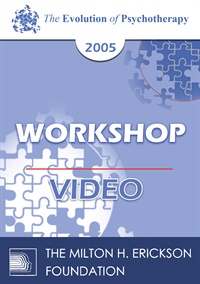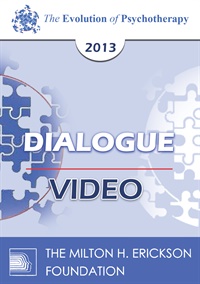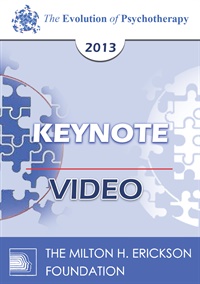- Average Rating:
- Not yet rated
- Topic Areas:
- Keynotes | Love | Couples Therapy | Polyvagal Theory | Intimacy | Neuroscience | Relationships
- Categories:
- Couples Conference | Couples Conference 2013
- Faculty:
- Stephen Porges, PhD
- Course Levels:
- Master Degree or Higher in Health-Related Field
- Duration:
- 56:26
- Format:
- Audio and Video
- Original Program Date:
- Apr 20, 2013
- Short Description:
- The Love Code provides a metaphor to explore the neural mechanisms underlying how and why we attach, bond, fall in love and seek out safe and trusted others in an unsafe world. This presentation will explore the body’s need for intimate engagement and social bonding from an adaptive perspective. Within the theoretical context of the Polyvagal Theory, the presentation will illustrate how specific features in our social environment may trigger neurophysiological systems, through a process of “neuroception,” that enables us either to be fearful and disengage or to feel safe and enter enduring intimate relations.
- Price:
-
Sale is $29.00
price reduced from Base Price - $59.00

- Average Rating:
- Not yet rated
- Topic Areas:
- Couples Therapy | Workshops | Love | Therapist Development
- Categories:
- Couples Conference | Couples Conference 2013
- Faculty:
- Bill O'Hanlon, MS
- Duration:
- 1:23:36
- Format:
- Audio Only
- Original Program Date:
- Apr 20, 2013
- Short Description:
- Using movie clips, this presentation will illustrate a simple five-step model for effectively intervening with couples. Bring the popcorn and have fun while you learn.
- Price:
- $15.00 - Base Price

- Average Rating:
- Not yet rated
- Topic Areas:
- Couples Therapy | Attachment | Keynotes | Anxiety | Intimacy | Sex and Sexuality | Love
- Categories:
- Couples Conference | Couples Conference 2015
- Faculty:
- Esther Perel, MA, LMFT
- Duration:
- 57:21
- Format:
- Audio Only
- Original Program Date:
- Apr 25, 2015
- Short Description:
- This bold take on intimacy and sex grapples with the obstacles and anxieties that arise when our need for secure love conflicts with our pursuit of passion. We will tackle eroticism as a quality of vitality in relationships extending far beyond mere sexuality and show how reconciling these two competing needs is at the heart of sustaining desire over time. We will address paradoxes of desire and how social forces inhibit erotic expression; attachment history and the erotic blueprint.
- Price:
- $15.00 - Base Price

- Average Rating:
- Not yet rated
- Topic Areas:
- Couples Therapy | Infidelity | Sex and Sexuality | Workshops | Love | Intimacy
- Categories:
- Couples Conference | Couples Conference 2015
- Faculty:
- Esther Perel, MA, LMFT
- Duration:
- 1:40:17
- Format:
- Audio Only
- Original Program Date:
- Apr 25, 2015
- Short Description:
- Through case examples, Esther Perel will show how to effectively engage such issues as intimacy, sexuality and infidelity by creating separate spaces where each partner can explore his/her feelings and experiences along with larger relationship dynamics. We will show how to navigate privacy and secrecy, honesty and transparency, stage interventions around sexual impasses, and structure a safe and flexible therapeutic environment to work effectively with infidelity.
- Price:
- $15.00 - Base Price

- Average Rating:
- Not yet rated
- Topic Areas:
- Couples Therapy | Workshops | Love | Relationships | Addiction | Sex and Sexuality | Trauma | Attunement | Communication
- Categories:
- Couples Conference | Couples Conference 2015
- Faculty:
- Alexandra Katehakis, MA, MFT
- Duration:
- 1:55:21
- Format:
- Audio Only
- Original Program Date:
- Apr 25, 2015
- Short Description:
- Sex addiction destroys trust in relationships, traumatizing the partner, the sex addict, and the family system. Relational trauma left untreated will have both parties and the entire system crumbling. Attunement, communication, and empathy (ACE) are the three pronged stool that supports the long, and sometimes arduous, journey to restoring trust. The goal is to recognize the signs of relational trauma in both parties, and compare the difference between relational trauma and co-dependence
- Price:
- $15.00 - Base Price

- Average Rating:
- Not yet rated
- Topic Areas:
- Couples Therapy | Workshops | Love | Communication | Intimacy | Relationships
- Categories:
- Couples Conference | Couples Conference 2015
- Faculty:
- Pat Love, EdD
- Duration:
- 1:34:46
- Format:
- Audio Only
- Original Program Date:
- Apr 25, 2015
- Short Description:
- While we love those deep, intimate conversations that bring us close together and join our spirits, what role does difference play in passion? Come explore this and other questions related to relational happiness. We will identify two empathic systems, and understand the role of dopamine in intimate relationships.
- Price:
- $15.00 - Base Price

- Average Rating:
- Not yet rated
- Topic Areas:
- Couples Therapy | Workshops | Intimacy | Love | Sex and Sexuality
- Categories:
- Couples Conference | Couples Conference 2015
- Faculty:
- Esther Perel, MA, LMFT
- Duration:
- 1:27:43
- Format:
- Audio Only
- Original Program Date:
- Apr 25, 2015
- Short Description:
- Why does great sex so often fade for couples who claim to love each other as much as ever? Why doesn’t good intimacy guarantee good sex? When you love , how does it feel and when you Desire how is it different? Loss of Desire brings many people into our offices. It is the prime sexual complaint that leads relational unhappiness, infidelity and even divorce. For the most part, sexuality has been relegated to sex therapy and couple therapy has been a desexualized practice. Yet, love in our digital age puts sex at the center of couples’ lives.
- Price:
- $15.00 - Base Price

- Average Rating:
- Not yet rated
- Topic Areas:
- Addiction | Workshops | Love
- Categories:
- Couples Conference | Couples Conference 2015
- Faculty:
- Pat Love, EdD
- Duration:
- 1:46:03
- Format:
- Audio Only
- Original Program Date:
- Apr 26, 2015
- Short Description:
- This workshop will explore the fine line between love and addiction. Therapeutic strategies and questions will be explored, and you will learn three predictors of compulsion/ addiction.
- Price:
- $15.00 - Base Price
Tags: Addiction Love Couples Therapy

- Average Rating:
- Not yet rated
- Topic Areas:
- Couples Therapy | Workshops | Love | Communication | Conflict | Relationships
- Categories:
- Couples Conference | Couples Conference 2015
- Faculty:
- Bill O'Hanlon, MS
- Duration:
- 1:36:23
- Format:
- Audio Only
- Original Program Date:
- Apr 26, 2015
- Short Description:
- Couples, because they come from different background and have different understandings, often use the same words to mean different things, leading to unnecessary conflict. This workshop will provide a simple, but powerful method to quickly resolve couples conflicts using action talk.
- Price:
- $15.00 - Base Price
- Average Rating:
- Not yet rated
- Topic Areas:
- Neuroscience | Addiction | Keynotes | Love | Couples Therapy
- Categories:
- Couples Conference | Couples Conference 2016
- Faculty:
- Helen E. Fisher, PhD
- Course Levels:
- Master Degree or Higher in Health-Related Field
- Duration:
- 01:55:21
- Format:
- Audio and Video
- Original Program Date:
- May 13, 2016
- Short Description:
- Biological anthropologist Helen Fisher discusses three brain systems that evolved for mating and reproduction: the sex drive; feelings of intense romantic love; and feelings of deep attachment to a long term partner. She then focuses on her brain scanning research (using fMRI) on romantic rejection and the trajectory of love addiction following rejection. She concludes with discussion of the brain circuits associated with long-term partnership happiness and the future of relationships in the digital age—what she calls “slow love.”
- Price:
-
Sale is $29.00
price reduced from Base Price - $59.00

- Average Rating:
- Not yet rated
- Topic Areas:
- Addiction | Workshops | Love | Relationships | Attachment | Couples Therapy | Sex and Sexuality | Attunement
- Categories:
- Couples Conference | Couples Conference 2017
- Faculty:
- Alexandra Katehakis, MA, MFT
- Duration:
- 1:57:10
- Format:
- Audio Only
- Original Program Date:
- Mar 31, 2017
- Short Description:
- Sex addiction destroys trust in relationships, traumatizing the partner, the sex addict, and the family system. Betrayal is an attachment injury that topples the regulatory systems of both parties, and when relational trauma is left untreated, both parties and the family system will suffer. Thus, when acute emotional and physical symptoms become chronic, treatment becomes more difficult making the prognosis for restoring the coupleship poor. Rapid intervention and interactive regulation between the couple is essential for relational healing to begin immediately. Attunement, communication, and empathy (ACE) are the three-pronged stool that supports the long, and sometimes arduous journey to restoring trust.
- Price:
- $15.00 - Base Price
Credit available - Click Here for more information
- Average Rating:
- Not yet rated
- Topic Areas:
- Addiction | Keynotes | Continuing Education | Love | Couples Therapy | Neuroscience | Sex and Sexuality
- Categories:
- Couples Conference | Couples Conference 2018 | Online Continuing Education
- Faculty:
- Helen E. Fisher, PhD
- Course Levels:
- Master Degree or Higher in Health-Related Field
- Duration:
- 57:05
- Format:
- Audio and Video
- Original Program Date:
- May 04, 2018
- Short Description:
- Biological anthropologist Helen Fisher discusses three brain systems that evolved for mating and reproduction: the sex drive; feelings of intense romantic love; and feelings of deep attachment to a long term partner. She then focuses on her brain scanning research (using fMRI) on romantic rejection and the trajectory of love addiction following rejection. She concludes with discussion of the brain circuits associated with long-term partnership happiness and the future of relationships in the dig
- Price:
-
Sale is $29.00
price reduced from Base Price - $59.00
Credit available - Click Here for more information
- Average Rating:
- Not yet rated
- Topic Areas:
- Addiction | Couples Therapy | Workshops | Continuing Education | Love | Neurobiology | Neuroscience
- Categories:
- Couples Conference | Couples Conference 2018 | Online Continuing Education
- Faculty:
- Helen E. Fisher, PhD
- Course Levels:
- Master Degree or Higher in Health-Related Field
- Duration:
- 1:57:48
- Format:
- Audio and Video
- Original Program Date:
- May 04, 2018
- Short Description:
- Biological Anthropologist Helen Fisher discusses four broad basic styles of thinking and behaving associated with four primary brain systems: the dopamine, serotonin, and testosterone and estrogen/oxytocin systems. She discusses why people are predisposed to love one person rather than another (mate choice). She hypothesizes that individuals who primarily express of the constellation of traits linked with each of these brain systems may be predisposed to different forms of love addiction, includ
- Price:
-
Sale is $29.00
price reduced from Base Price - $59.00

Credit available - Click Here for more information
- Average Rating:
- Not yet rated
- Topic Areas:
- Couples Therapy | Love | Continuing Education | Keynotes
- Categories:
- Couples Conference | Couples Conference 2021 | Online Continuing Education | Pioneers in Couples and Family Therapy
- Faculty:
- Stan Tatkin, PsyD, MFT
- Course Levels:
- Master Degree or Higher in Health-Related Field
- Duration:
- 1 Hour 2 Minutes
- Format:
- Audio and Video
- Original Program Date:
- Jun 05, 2021
- Short Description:
- An exploration of how principle-based relationships—grounded in shared purpose, vision, and governance—can anchor couples amid stress, miscommunication, and human fallibility. Emphasizing co-regulation and mutual accountability, the session highlights how therapists can guide partners toward secure functioning while attending to broader ethical, social, and psychological dimensions of relational life.
- Price:
- $29.00 - Base Price
- Average Rating:
- Not yet rated
- Topic Areas:
- Workshops | Masculinity | Relational Life Therapy Model (RLT) | Intimacy | Love
- Categories:
- Couples Conference | Couples Conference 2023 | Pioneers in Couples and Family Therapy
- Faculty:
- Terry Real, LICSW
- Course Levels:
- Master Degree or Higher in Health-Related Field
- Duration:
- 1:34:03
- Format:
- Audio and Video
- Original Program Date:
- May 05, 2023
- Short Description:
- This talk introduces key insights from "Us: Getting Past You and Me to Build a More Loving Relationship", focusing on the concept of “loving power”—a blend of assertiveness and cherishing. It examines how patriarchy and individualism contribute to relational trauma and offers strategies from Relational Life Therapy (RLT), including loving confrontation, trauma repair, and skill-building. Emphasis is placed on self-disclosure, humility, and cultivating authentic connection.
- Price:
- $59.00 - Base Price
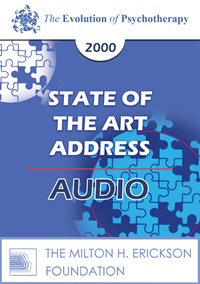
- Average Rating:
- Not yet rated
- Topic Areas:
- Children and Adolescent Therapy | State of the Art Address | Love | Couples Therapy | Psychotherapy | Special Topics
- Categories:
- Evolution of Psychotherapy | Evolution of Psychotherapy 2000
- Faculty:
- Laura Huxley
- Duration:
- 40 Minutes
- Format:
- Audio Only
- Original Program Date:
- May 26, 2000
- Short Description:
- State of the Art Address 01: In 1978 Laura Huxley founded Children: Our Ultimate Investment, an organization for the nurturing of the possible human. Mrs. Huxley will speak about the foundation's ongoing projects and elucidate the message of the unconceived to the men and women who will be their creators. Introduced by Bernhard Trenkle, Dipl. Psych.
- Price:
- $15.00 - Base Price
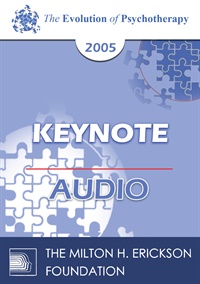
- Average Rating:
- Not yet rated
- Topic Areas:
- Keynotes | Special Topics | Love | Social Issues | Trauma
- Categories:
- Evolution of Psychotherapy | Evolution of Psychotherapy 2005
- Faculty:
- Hunter "Patch" Adams, MD
- Duration:
- 1 Hour
- Format:
- Audio Only
- Original Program Date:
- Dec 07, 2005
- Short Description:
- This unforgettable keynote blends performance, activism and raw humanity as Patch Adams calls for a global shift from power and greed toward compassion, justice and communal care. Moving between poetry, personal stories, global witness and clowning, he illustrates how love, presence and joyful service can interrupt violence, heal despair and restore our capacity to act. Participants are invited into a stirring reflection on what it means to live bravely, serve wholeheartedly and redesign a world rooted in human dignity.
- Price:
- $15.00 - Base Price
- Average Rating:
- Not yet rated
- Topic Areas:
- Workshops | Rational Emotive Behavior Therapy (REBT) | Psychotherapy | Love | Relationships | Sex and Sexuality
- Categories:
- Evolution of Psychotherapy | Evolution of Psychotherapy 2005
- Faculty:
- Albert Ellis, PhD
- Course Levels:
- Master Degree or Higher in Health-Related Field
- Duration:
- 2:10:28
- Format:
- Audio and Video
- Original Program Date:
- Dec 07, 2005
- Short Description:
- Dr. Ellis will present cognitive, emotional and behavioral techniques to help men and women in their sex, love and marital relationships. He also will include therapy helping their interpersonal relationships in work situations.
- Price:
-
Sale is $29.00
price reduced from Base Price - $59.00
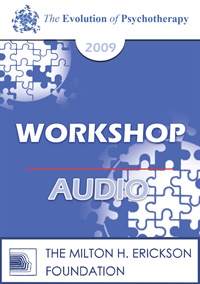
- Average Rating:
- Not yet rated
- Topic Areas:
- Workshops | Love | Emotionally Focused Therapy (EFT) | Psychotherapy
- Categories:
- Evolution of Psychotherapy | Evolution of Psychotherapy 2009
- Faculty:
- Sue Johnson, EdD
- Duration:
- 2 Hours 12 Minutes
- Format:
- Audio Only
- Original Program Date:
- Dec 12, 2009
- Short Description:
- This workshop offers participants the wisdom gained from our new scientific understanding of love, and from 25 years of research and clinical practice in Emotionally Focused Couple Therapy (EFT). The first part of the workshop will present a clear picture of romantic love as the natural arena for personal health, resilience and growth. The second part of the workshop outlines and guides participants into four conversations to enhance your relationship: Recognizing Demon Dialogues, Finding Raw Spots, the pivotal Hold Me Tight conversation, and Forgiving Injuries. Better communication, more effective problem solving, more empathetic caring and improved sexual relationships are just some of the improvements associated with a more secure bond.
- Price:
- $15.00 - Base Price
- Average Rating:
- Not yet rated
- Topic Areas:
- Dialogues | Love | Neuroscience | Psychotherapy
- Categories:
- Evolution of Psychotherapy | Evolution of Psychotherapy 2013
- Faculty:
- Diane Ackerman, MFA, PhD | Daniel Siegel, MD
- Course Levels:
- Master Degree or Higher in Health-Related Field
- Duration:
- 58:06
- Format:
- Audio and Video
- Original Program Date:
- Dec 13, 2013
- Short Description:
- This dialogue brings together a poet and a neuroscientist for a rich, unscripted exploration of love, creativity and the mind. They trace how attention, wonder and presence awaken creativity, how trauma can imprison the brain’s patterns, and how attunement and resonance in therapy create healing connection. Participants hear a fluid blend of science, story and lived experience that illuminates why openness, mindfulness and human relationship expand what the brain—and the heart—can do.
- Price:
-
Sale is $29.00
price reduced from Base Price - $59.00
- Average Rating:
- Not yet rated
- Topic Areas:
- Couples Therapy | Invited Addresses | Love | Psychotherapy
- Categories:
- Evolution of Psychotherapy | Evolution of Psychotherapy 2013
- Faculty:
- Sue Johnson, EdD
- Course Levels:
- Master Degree or Higher in Health-Related Field
- Duration:
- 58:51
- Format:
- Audio and Video
- Original Program Date:
- Dec 14, 2013
- Short Description:
- EP13 Invited Address 12 – The New Science of Love: A New Era for Couple Interventions – Sue Johnson, EdD We have cracked the code of romantic love. We can precisely target interventions and shape the core defining moments of a love relationship. Adult attachment science offers a clear map to the creation of a secure lasting bond. New findings in neuroscience promise couple interventions that may be the most potent and far-reaching form of therapeutic intervention ever devised.
- Price:
-
Sale is $29.00
price reduced from Base Price - $59.00
- Average Rating:
- Not yet rated
- Topic Areas:
- Keynotes | Love | Marriage | Neuroscience | Psychotherapy
- Categories:
- Evolution of Psychotherapy | Evolution of Psychotherapy 2013
- Faculty:
- Diane Ackerman, MFA, PhD
- Course Levels:
- Master Degree or Higher in Health-Related Field
- Duration:
- 1:01:41
- Format:
- Audio and Video
- Original Program Date:
- Dec 12, 2013
- Short Description:
- This keynote is a deeply personal story about love, caregiving and the brain’s ability to reinvent itself after catastrophic injury. Diane Ackerman shares her husband’s stroke and aphasia, the surreal early days of recovery, and the creative, highly individualized methods she used to help him re-learn language and rebuild a life. Participants gain an intimate look at neuroplasticity, resilience, and the emotional transformation of long-term caregiving, illuminated with humor, devotion and hard-won insight.
- Price:
-
Sale is $29.00
price reduced from Base Price - $59.00
- Average Rating:
- Not yet rated
- Topic Areas:
- Addiction | Attachment | Couples Therapy | Keynotes | Love | Relationships
- Categories:
- Evolution of Psychotherapy | Evolution of Psychotherapy 2021
- Faculty:
- Helen E. Fisher, PhD
- Course Levels:
- Master Degree or Higher in Health-Related Field
- Duration:
- 1 hour
- Format:
- Audio and Video
- Original Program Date:
- Dec 03, 2021
- Short Description:
- Is technology changing love? Why do you fall in love with one person rather than another? Why is the rejected brain primed for psychotherapy? How can you use neuroscience to keep love alive? And where are we headed in our digital age? Anthropologist and neuroscientist Dr. Helen Fisher uses her brain scanning work (fMRI) to discuss three basic brain systems that evolved for mating and reproduction--the sex drive, romantic love, and attachment; each plays a pivotal role in human health and happiness. And she uses her data on 50,000 single Americans to explain a new (and positive) trend in courtship, what she calls “slow love.” She then discusses her data on the biological foundations of human personality—specifically four basic styles of thinking and behaving that impact love relationships and all other social interactions.
- Price:
- $59.00 - Base Price
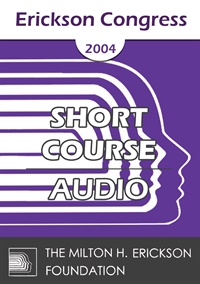
- Average Rating:
- Not yet rated
- Topic Areas:
- Short Courses | Brief Therapy | Ericksonian Hypnosis and Therapy Techniques | Family Therapy | Love | Relationships | Couples Therapy
- Categories:
- Erickson Congress | Erickson Congress 2004
- Faculty:
- Patricia Davis, MA
- Duration:
- 1:19:45
- Format:
- Audio Only
- Original Program Date:
- Dec 02, 2004
- Short Description:
- The main root cause of mental illness is relationships which are not working effectively. Violence, abuse, injustice, neglect and power struggles lead to most individuals' symptoms. This workshop will teach how to change and heal individuals by using their families, no matter how family is defined, to achieve a successful therapy in a brief time period. Attendees will learn specific Ericksonian strategies and healing rituals to which Dr. Erickson would give a "thumbs-up."
- Price:
- $15.00 - Base Price
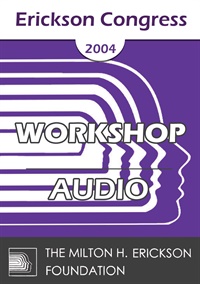
- Average Rating:
- Not yet rated
- Topic Areas:
- Workshops | Love | Couples Therapy
- Categories:
- Erickson Congress | Erickson Congress 2004
- Faculty:
- Michele Ritterman
- Duration:
- 2:37:47
- Format:
- Audio Only
- Original Program Date:
- Dec 04, 2004
- Short Description:
- In this workshop, attendees will learn how to recognize couple symptoms as shared or separate-track trances and it will be demonstrated that symptom inductions in couples are something we can observe. Dr. Ritterman will teach, through entrancing role plays, methods to counter destructive couples suggestions with beneficial hypnotherapeutic counter-inductions. She will focus on the use of synchronicity and reciprocity in couples development. Attendees will gain an understanding of trance and hypnotic happenings in couples and receive supervisory input for innovative ways to help couples heal each other and love again.
- Price:
- $15.00 - Base Price







